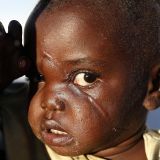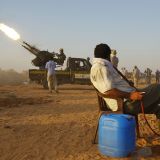Goran Tomašević
WAR
Seebad Enge
Goran Tomašević is a living legend. Not only has he survived for 30 years in crisis areas, but he has also mastered the art of photography.
War: Blood. Fire. Smoke. Death. Pain. And yet there is hope. Photojournalists are forced to witness war. Humanism characterises Goran’s work. Intuition guides his existence. His photos are permeated by noise, stench and the quintessence of a place. The pictorial compositions convey a knowledge of the situation, a hidden, absorbed, merged being with the subject. Goran Tomašević stands clearly in the tradition of war reportage by James Nachtwey, Robert Capa, Larry Burrows and Don McCullin. And in his own unique way, he also refers to Mathew Brady, who wanted to bring the “smell of death” into American households during the Civil War of 1861.
His powerful, terrifying work conveys a Dantesque vision of our humanity. In one of his rare interviews, he explains that he never takes sides when working in the field. And, “If you want to convey the facts authentically, you have to be where they are. That is the challenge”. Tomašević, considered by many to be a wonderful Caravaggio of photography, has been awarded the most prestigious international prizes: World Press Photo Award, POYi, China International Press Photo of the Year, SOPA Award, London Frontline Club Award, National Press Photography Association, Best of Photo journalism, Reuters Photographer of the Year four times, and in April 2019 Tomašević and several of his Reuters colleagues were awarded the Pulitzer Prize for Breaking News Photography for their coverage of the mass migration of Central and South Americans to the United States.
Curated by Lois Lammerhuber / Printed by ![]()
Discover here contributions of ETH Zurich to the Sustainable Development Goal (SDG) 16:
How to build a robot judge
Elliott Ash
Renowned for his expertise in law, economics, and data science, Elliott Ash employs a wide array of tools derived from social science and data analytics to gain insights into the complexities of laws and the legal system.
Since his teenage years, Elliott has been fascinated by governance and societal organisation, working to improve people’s lives through better institutions. At university, he studied criminal law as a crucial aspect of policy, incorporating economics and social sciences into legal decisions. For his Doctoral degree, he explored the selection and monitoring of judges, and used computational tools to understand policymakers‘ attitudes and priorities through their speeches and writings.
Using AI to democratise the law
Elliott’s team examines law and politics using a mix of tools from social science and data science. For instance, they created a corruption detection system for local governments in Brazil. They also investigated how judges‘ perceived gender stereotypes influence their decisions on gender rights issues. For a project with a focus on India, they delved into gender, religion, and caste biases among judges.
A well-functioning judiciary needs publicly accessible reasons underlying the law. However, laws are becoming less easily understood as they become more complex due to technology and globalisation. Media institutions struggle to translate rulings due to reduced resources and increasing politicisation. Artificial intelligence, particularly GPT-4, now offers some hope for improving legal accessibility: Elliott’s research demonstrates how AI can translate complex legal terms into readable summaries of judicial opinions.
Reducing bias
The law is used to manage conflict, domestically and internationally. To do this work, judges need skills and incentives to issue decisions that are in line with societal norms. Technology and well-functioning institutions can reduce bias that may affect this work among judges and policymakers.
“We need to align incentives of policymakers with the public, while giving the public access to more information. We need to trust people to make the right decisions in the long run when given all the information.”
Prof. Dr. Elliott Ash, Elliott Ash is Assistant Professor of Law, Economics, and Data Science at ETH Zurich
Taking control of social media to build peace
Medinat Malefakis
Dr. Medinat Malefakis studied in Nigeria, at the Ahmadu Bello University Zaria and the Nigerian Defence Academy, before moving to Zurich as a visiting PhD student. Her research focuses on the humanitarian challenge of forced displacement caused by conflict and terrorism. Medinat analyses peacebuilding that evolves at the same time as an ongoing conflict, which she sees as a way to lower displacement and foster reintegration and rehabilitation. Digital technologies play a key role in her work.
A conflict catalyst and a peacebuilding tool
In her research, Medinat scrutinises the use of social media and other digital technologies in conflicts and social movements in Nigeria. Her work explores their potential as peacebuilding tools, rather than catalysts for conflict and terrorism.
In times of conflict, the digital technology industry tends to adopt an intervention mode which is often limited to regulating inflammatory language and disinformation. Medinat’s work goes beyond this to look into the agency and lived reality of people affected by conflict. Through the case-study of a social movement in Nigeria – the #ENDSARS movement and the Boko Haram terrorist insurgency – her research proposes a new model for co-creating peacebuilding initiatives. The idea is to enable groups which are prone to conflict triggered by digital technologies to define their own way of approaching peacebuilding. Medinat is convinced that co-creation will make peacebuilding processes more sustainable.
Mindful of the complex dynamics that determine the course of conflicts across the world, and in Nigeria specifically, she believes that greater awareness of the various ways in which social media influence and reinforce those dynamics can be used to strengthen peacebuilding.
Peacebuilding before development
Peace is necessary for development. Societies make better progress when social and economic policies are developed and implemented in a secure environment. By promoting a method that enables conflict-affected groups to propose peacebuilding mechanisms that suit them, Medinat’s research also fosters inclusivity, justice, and sustainability. Digital technologies and social media command a large part of our attention economy, making them an important and solid peacebuilding tool.
“The research is about promoting peace for conflict and war-torn societies.”
Dr. Medinat Malefakis, Senior Lecturer at the Department of Humanities, Social and Political Sciences at ETH Zurich
Working through conflict on film
Jeanine Reutemann, Lars-Erik Cederman, Claudia Zingerli
In 2017, an international research group set out to produce a 68-minute documentary film titled ‘Inequality and Conflict: Beyond Us and Them’.
It turned out to be a transformative journey for Dr. Jeanine Reutemann, lead of the ETH LET EduMedia Hub since 2022, Dr. Claudia Zingerli, formerly coordinator of the Swiss Programme for Research on Global Issues for Development and since 2022 Head ETH Sustainability, and Professor Lars-Erik Cederman, Professor of International Conflict Research at ETH Zurich since 2003. Together with research partners from the Ethnic Power Relations project, led by Lars-Erik, as well as two other research teams from a total of 11 countries, they produced a film that informs a wide audience about research-based solutions for more peaceful, just and inclusive societies that speak to each other in a unique way. The project brings together insights from Guatemala, Nigeria, Switzerland, Sri Lanka and Indonesia.
Nuanced research and personal stories
The research documentary was produced by collaborating across boundaries between places and people, taking account of different types of knowledge and experiences of working through inequality and conflict. Non-academic partners featured as protagonists, sharing their life experiences as well as the images of inequality in their environment. These contributions created new connections between different settings, scales, concepts and research results, helping to create a film that puts research findings into context and presents solutions for more peaceful, just and inclusive societies. As a process of synthesising research, the filmmaking combines and complements selected results that emerged from the distinct methodologies of three research projects looking at how social conflicts across the globe can be mitigated.
The personal stories of the protagonists help to make nuanced and detailed research insights more accessible, giving the audience more direct access to the global issues of ethnic power relations, gender inequality and what it means to deal with a painful history. These are necessary ingredients to understand the social conflicts of today, and to advise on peacebuilding policy.
The international production team around filmmaker Jeanine collaborated on-site and off-site. Their work revealed how people and groups with similar experiences of social conflict had very different perspectives and perceptions of that conflict. Time and again, they found evidence that the reality is always more complex than the binary ‘them against us’ narrative. The film reveals the story of people taking the struggle for inclusion beyond that narrative, without shying away from addressing painful pasts, discrimination and conflict.
Filmmaking for sustainable development
Filmmaking can change the way we see and represent science and global issues. Visuals and spoken testimonies reveal a human dimension of inequality and conflict that is often hidden within the more abstract world of data.
“We live in an era where alternative facts and fake news distort policy-making and (..) the link between inequality and conflict could actually get worse because of this. We need to shed light on these problems and therefore you need evidence-based research.”
Lars-Erik Cederman, 2019
open your eyes festival buerau
Botenaustrasse 42
9443 Widnau
Switzerland
Phone: +41 44 218 11 03




